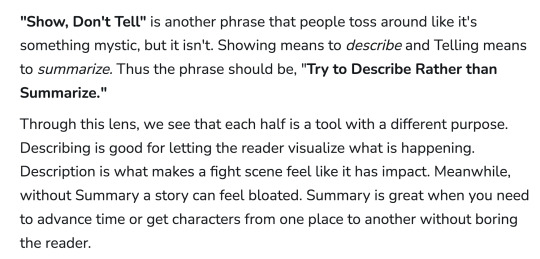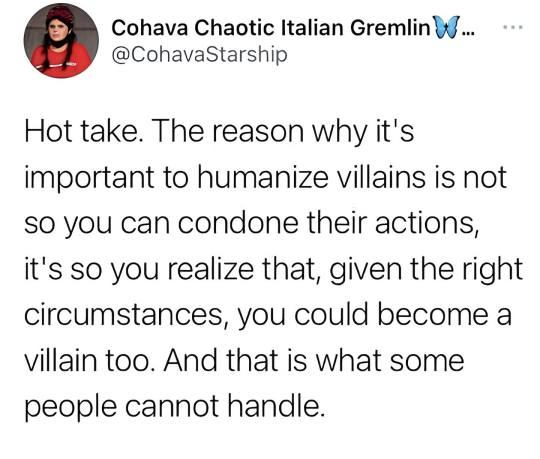Text
"what advice do you have for new writers?" well i could say the typical (but important!) "practice" "read books" but my PERSONAL advice as someone who's been writing since he was a toddler is as follows: feel every emotion u can & touch every texture u can & search for obscure facts or antiquated words or animal behavior or something you wouldn't normally think about. the most arbitrary things can bring inspiration. branch out! leave your comfort zone and seek things that are new & unknown to you. learn to find wonder and beauty in some aspect of the world, but hopefully many aspects. learn how to be patient tbh. fall in any kind of love with anything. most importantly treat yourself with kindness and care and forgiveness - i get wanting to write about pain, trust me, but also trust me, your writing will evolve as your perception of yourself softens. oh yeah and always have a pen on you
10K notes
·
View notes
Text
The rule of thumb is not "listen to marginalized people about everyone's experiences", it's "listen to marginalized people about their own oppression".
It's not "listen to the most marginalized person in the room", it's "listen to the people who have actually had the experiences being discussed, instead of assuming what those experiences are like".
It's not "stop having an opinion, shut the fuck up, and absorb uncritically whatever a marginalized person has most recently told you", it's "everyone knows their own experiences best, just like you know your's, and it's important to listen to different perspectives in order to truly understand the problem".
Marginalized people don't know everything, and certainly aren't a monolith. The whole point of that idea is just to get people to listen to each other. If all of us are doing that, and genuinely trying to understand others without making assumptions or abandoning critical thought entirely, we'll get there in the end.
22K notes
·
View notes
Text
Fiction Writing Advice Posts
Hey all, Some of you know that in addition to this Tumblr blog I also keep a blog on my website. A lot of the posts overlap, but not all of them, so I’ve made this list for your reading pleasure:
How to Control Your Pacing
How to Write During a Pandemic
How to Read Like a Writer
What if Your First Draft DOESN’T Suck?
How to Do World-Building Research
How to Properly Format a Manuscript for Submission
10 Questions to Ask an Editor Before Hiring Them
Creating Character Arcs with the DCAST Method
How to Choose the Right Point of View for Your Story
A Beginner’s Guide to Multiple Point of View
Show Don’t Tell? Not Always. Here’s When to Use Summary
8 Ways to Improve Your Fiction Writing
How to Spot Bad Writing Advice: 6 Red Flags to Look For
5 Reasons to Kill Your Critique Group
Are You Using Too Much Stage Direction?
Why Nobody Cares About Your Plot
How to Use Adverbs Like a Pro
How to Activate Your Passive Characters, One Verb at a Time
3 Easy Ways to Transform Boring Descriptions
3 Ways to Increase Conflict in Your Dialogue
A Step-by-Step Guide to Getting Killer Feedback from Beta Readers
How to Know What Kind of Editing You Need
10 Best Books About Fiction Writing
How to Spot an Info Dump
Dealing With Procrastination
5 Tips for Writing Great Descriptions
Naming Your Fictional Characters
How to Avoid Overusing “I” in a First Person Story
How to Get Over a Writing Slump
When Your Story Gets a Lackluster Response From Readers
She Hesitated, He Paused: Tips on Showing the Passage of Time
Want to make sure you never miss a new blog post? Sign up for my writing advice emails and get a new blog post sent straight to your inbox about once a month.
xoxo
10K notes
·
View notes
Text
Tips for Writing Interrupted Scenes
Scenes don’t always happen from start to finish. When you need to write interruptions, use these tips to get more confident about breaking up plot points and stitching them back together.
Pick an Emotional Cliffhanger
When your character gets the phone call about the job that could change their life, they hesitate to answer it.
A new chapter begins on the next page from another point of view.
But what happened with the phone call??
Your readers will keep going through the next chapter because they were left on an emotional cliffhanger with a character they love. The break won’t seem as natural as others, like ending a chapter when your character goes to bed or leaves a venue.
Plot Your Scene Breaks
Write a rough plot line, even if you don’t normally plan any outlines. It helps to know where your story is going so you can insert the rest of the scene more effectively.
Picture your character—they’re running a marathon and they’re starting the final mile. Their focus gets interrupted by something in the treeline to their left. It’s the childhood version of themselves, hanging upside down from a branch and waving. They have to go find out what that is, so the protagonist interrupts their race by sprinting into the woods.
Although the rest of the story may involve spooky moments and weeks or months of drama, the race never gets finished. Maybe the protagonist runs the same last mile after the event is over, when it’s back to being a regular street. They conquer the mile after completing the lesson or purpose of the plot.
That’s much easier to keep track of if there's a rough plotline to follow. Using bullet points can help or try writing a one-sentence description of each big plot moment on a sticky note.
Add More While Editing
If you have multiple moments that get interrupted, like broken dialogue or plot points, you may not remember to tie them together or make the break essential to the plot. That’s okay!
That’s what editing is for.
While you’re re-reading, make a list of every moment when something gets interrupted and another of when those moments get completed or resolved. You’ll easily tell what’s left unsaid that would otherwise feel like a plot hole.
-----
You may not always have interrupted scenes in every story. When you feel like they’re necessary, I hope these tips help you feel more confident about writing and editing them. 💛
3K notes
·
View notes
Text
Exactly! there are sites built around crit reviews--I personally enjoy writing.com
if someone is posting their work on a site built for enjoyment, unsolicited advice is just unnecessary and kind of cruel. it’s a fun activity. sometimes that is all.
#/rant#i love receiving feedback when i post writing in places#but i do so in places i expect it#writing is a fun hobby#and it's a brutal slog of a discipline#not always both for the same person or same piece#writing#writeblr#creative writing
189K notes
·
View notes
Note
Do you have any advice for writing an intimidating character?
Writing an Intimidating Character
An intimidating person is someone with a personality that is so confident, strong, and dominating that it often causes other people’s own self-confidence to shatter in their presence. An intimidating person can make others feel timid, weak, inferior, and even afraid. Most intimidating people are good people who don’t realize they make people feel that way. Others are generally good people who use intimidation to get ahead in life. Then, of course, you have a small percentage of people who are bad and are intimidating by their very nature, or who use intimidation as a way of daunting their enemies and underlings.
The first thing you have to do when writing an intimidating character is decide what kind of intimidating character you have:
1. Good/Natural - this is a good or generally good person who is naturally intimidating and isn’t aware that their personality or presence makes anyone feel timid or weak. They may benefit from their intimidating nature, but they don’t realize it and would never exploit it if they did.
2. Good/Natural/Isolated - this is a good or generally good person who doesn’t broadly present as intimidating, but is perceived as intimidating by a small group or even a single person. They don’t know they’re intimidating to anyone and aren’t really benefiting from it, but they may have trouble connecting with the person or group who finds them intimidating.
3. Good/Intentional - this is a generally good person who is intentionally intimidating and use it to get ahead in life, but never in a way that is controlling or harmful to other people. When they talk, people listen, and they like that this works to their benefit.
4. Bad/Natural - this is a generally bad person who is intimidating by their very nature. They don’t force intimidating behaviors, but because they like feeling dominant, they’re more aware of how people behave in their presence and can see that they make people feel timid and weak. They use this to their advantage even if they don’t fully realize what it is about them that makes people feel that way.
5. Bad/Intentional - this is a bad or generally bad person who is intentionally intimidating and uses it to dominate and control their enemies and underlings. This person may have a natural inclination toward intimidation which they further affect for more impact. Or, this person may fully affect their intimidating personality, only dropping it behind closed doors.
Once you know the type of intimidating person you have, it’ll be easier to figure out how to write them. You can do research on traits of intimidating people by Googling “intimidating traits” or “intimidating personality characteristics.” Start a list to write down all the characteristics that would work for your character, then figure out how these would make other characters feel and, if applicable, how your character would benefit from these traits. :)
307 notes
·
View notes
Text
my dad–also a writer–came to visit, and i mentioned that the best thing to come out of the layoff is that i’m writing again. he asked what i was writing about, and i said what i always do: “oh, just fanfic,” which is code for “let’s not look at this too deeply because i’m basically just making action figures kiss in text form” and “this awkward follow-up question is exactly why i don’t call myself a writer in public.”
he said, “you have to stop doing that.”
“i know, i know,” because it’s even more embarrassing to be embarrassed about writing fanfic, considering how many posts i’ve reblogged in its defense.
but i misunderstood his original question: “fanfic is just the genre. i asked what you’re writing about.”
i did the conversational equivalent of a spinning wheel cursor for at least a minute. i started peeling back the setting and the characters, the fic challenge and the specific episode the story jumps off from, and it was one of those slow-dawning light bulb moments. “i’m writing about loneliness, and who we are in the absence of purpose.”
as, i imagine, are a lot of people right now, who probably also don’t realize they’re writing an existential diary in the guise of getting television characters to fuck.
“that’s what you’re writing. the rest is just how you get there, and how you get it out into the world. was richard iii really about richard the third? would shakespeare have gotten as many people to see it if it wasn’t a story they knew?”
so, my friends: what are you writing about?
#aren't we all - in some small way - writing about the human condition?#writing#writeblr#creative writing#writing motivation
140K notes
·
View notes
Text

On "Show, Don't Tell" (from my latest writing Q&A)
2K notes
·
View notes
Text

66K notes
·
View notes
Text
every writing tip article and their mother: dont ever use adverbs ever!
me, shoveling more adverbs onto the page because i do what i want: just you fucking try and stop me
241K notes
·
View notes
Text
it sounds ridiculously obvious now, but one of the best pieces of writing advice i've ever received is that most of the time, a character's flaws are also their strengths. a smart person might have trouble admitting they're wrong, or break down when they don't know how to solve something; a practical, capable person might lack emotional intelligence. a determined person might be so focused on their goals that they neglect their friends and ignore anything "superfluous" (i.e. they don't notice minor details that turn out to be important later on). kindness can become naivety; open-mindedness can become centrism; confidence can become arrogance. sometimes it's tempting to just reach into a grab bag of positive and negative traits and sprinkle them in at random, but it's much better to instead isolate the things you like about your character and take those traits to the logical extreme.
9K notes
·
View notes
Text
"But let me give you the dark side of writing groups. One really dark side of writing groups is, particularly newer writers, don't know how to workshop.
"And one of the things they'll try to do is they'll try to make your story into the story they would write, instead of a better version of the story you want to write.
"And that is the single worst thing that can happen in feedback, is someone who is not appreciating the story you want to make, and they want to turn it into something else.
"New workshoppers are really bad at doing this. In other words, they're really good at doing a bad thing, and they're doing it from the goodness of their heart. They want you to be a better writer. They want to help you. The only way they know is to tell you how they would do it, which can be completely wrong for your story."
—Brandon Sanderson, Lecture #1 Introduction, Writing Science Fiction And Fantasy
28K notes
·
View notes
Text
In regards to making a list, I like to write the story first, then after the characters are fairly fleshed-out, write what traits I gave them (they gave themselves, really). Then it’s easy to see a list and see if there are any traits I should focus on more, or any to dump/change to better fit the overall character.
Tip Tuesday | Developing Realistic Characteristics

Hello, hello peeps! Hope everyone is staying safe and healthy! I am going to go back to more writing related tips this week. I am going to talk about developing realistic characteristics for your characters. Just a few tips and tricks to help you out with your OCs and Reader inserts.
1. Don’t make a list of traits for your characters. I know, I know, traditional advice is create a character sheet for your OCs, but hear me out. When you make a list of characteristics and/or traits, you can have the tendency to try to fit those traits into your story, which can feel forced. Instead allow the traits to be introduced in a more organic fashion. Drop them in like little jewels throughout your story.
2. Based traits on real people. Pay attention to the people around you. Use some of those quirks in your own characters. Mix and match. Pick some positive and negative traits. One of my most favorite stories are my Meeting Your Heroes stories, the reader in their is very self-insert. So a lot of the characteristics/details are based roughly on me. I think those traits have made that story so enjoyable to others.
3. Give people real flaws. Everyone has flaws, like real life altering flaws. Perhaps they are notorious for avoiding difficult situations. Or they are clumsy. Or quick to anger. Make sure all your characters have honest to goodness flaws (not those surface flaws that are actually positive traits!). Make them bad at something. Make them struggle, suffer! Make them human!!!
4. Give your characters a unique vocabulary. Another great way to breathe life into your characters. Give them catchphrases, slang, etc. This can help determine a person’s age, nationality, education, etc. It also helps make your dialogue feel more naturally.
And there you go! I hope this helps you develop some well rounded characters. Until next week!
2K notes
·
View notes
Note
As someone whose advice is often “just write”… how do you feel about plotting out books in advance, or about people who swear that it is the only correct method?
That's "just write" too. And you'll probably need some kind of a plot, even if it's just "she'll go through the door into the other world, and she'll meet the Other Mother, and then she'll come back and then she'll have to go back again and sort things out". It's not automatic writing. But how much detail you need and what you invent as you go is going to change.
What I don't enjoy doing is plotting too tightly, because it feels like I'm too constrained by something past me decided. I would rather feel I was collaborating with past me, and throwing balls in the air for future me to catch.
Nobody who says "this is the only way to write" is ever telling you the truth, unless they add "for me, at least" at the end of their sentence.
1K notes
·
View notes
Text

The reason none of my wips get finished
45K notes
·
View notes
Text

10K notes
·
View notes
Text

91K notes
·
View notes